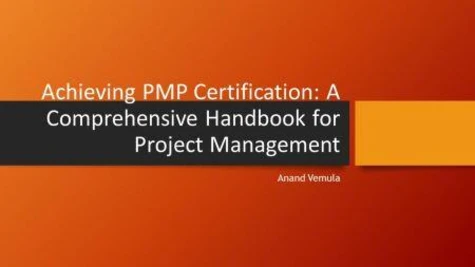Achieving PMP Certification: A Comprehensive Handbook for Project Management
Par :Formats :
Actuellement indisponible
Cet article est actuellement indisponible, il ne peut pas être commandé sur notre site pour le moment. Nous vous invitons à vous inscrire à l'alerte disponibilité, vous recevrez un e-mail dès que cet ouvrage sera à nouveau disponible.
Disponible dans votre compte client Decitre ou Furet du Nord dès validation de votre commande. Le format ePub est :
- Compatible avec une lecture sur My Vivlio (smartphone, tablette, ordinateur)
- Compatible avec une lecture sur liseuses Vivlio
- Pour les liseuses autres que Vivlio, vous devez utiliser le logiciel Adobe Digital Edition. Non compatible avec la lecture sur les liseuses Kindle, Remarkable et Sony
 , qui est-ce ?
, qui est-ce ?Notre partenaire de plateforme de lecture numérique où vous retrouverez l'ensemble de vos ebooks gratuitement
Pour en savoir plus sur nos ebooks, consultez notre aide en ligne ici
- FormatePub
- ISBN8230180531
- EAN9798230180531
- Date de parution30/11/2024
- Protection num.pas de protection
- Infos supplémentairesepub
- ÉditeurIndependently Published
Résumé
Achieving PMP Certification: A Comprehensive Handbook for Project Management" serves as an essential guide for aspiring project managers seeking to obtain their Project Management Professional (PMP) certification. This handbook integrates both traditional project management principles and Agile methodologies, providing a well-rounded approach to managing projects in today's dynamic environments. The book begins by outlining the importance of PMP certification, which is recognized globally as a standard for project management excellence.
It details the eligibility requirements, including the necessary experience and education, ensuring readers understand what is needed to qualify for the exam. The authors emphasize the significance of the PMBOK® Guide, which serves as a foundational resource for understanding key concepts, processes, and knowledge areas critical to successful project management. Throughout the handbook, readers will find practical applications of project management theories, with a strong focus on real-world scenarios.
The integration of Agile practices is highlighted, showcasing how flexibility and iterative development can enhance project outcomes. This dual approach prepares candidates not only for the PMP exam but also equips them with skills applicable in various project environments. Key topics covered include risk management, stakeholder engagement, scope definition, and quality assurance. The book provides strategies for effective communication and collaboration among team members and stakeholders, essential for both Agile and traditional methodologies.
Additionally, it includes tips on how to navigate common challenges faced during projects, ensuring readers are well-prepared to handle unexpected situations.
It details the eligibility requirements, including the necessary experience and education, ensuring readers understand what is needed to qualify for the exam. The authors emphasize the significance of the PMBOK® Guide, which serves as a foundational resource for understanding key concepts, processes, and knowledge areas critical to successful project management. Throughout the handbook, readers will find practical applications of project management theories, with a strong focus on real-world scenarios.
The integration of Agile practices is highlighted, showcasing how flexibility and iterative development can enhance project outcomes. This dual approach prepares candidates not only for the PMP exam but also equips them with skills applicable in various project environments. Key topics covered include risk management, stakeholder engagement, scope definition, and quality assurance. The book provides strategies for effective communication and collaboration among team members and stakeholders, essential for both Agile and traditional methodologies.
Additionally, it includes tips on how to navigate common challenges faced during projects, ensuring readers are well-prepared to handle unexpected situations.
Achieving PMP Certification: A Comprehensive Handbook for Project Management" serves as an essential guide for aspiring project managers seeking to obtain their Project Management Professional (PMP) certification. This handbook integrates both traditional project management principles and Agile methodologies, providing a well-rounded approach to managing projects in today's dynamic environments. The book begins by outlining the importance of PMP certification, which is recognized globally as a standard for project management excellence.
It details the eligibility requirements, including the necessary experience and education, ensuring readers understand what is needed to qualify for the exam. The authors emphasize the significance of the PMBOK® Guide, which serves as a foundational resource for understanding key concepts, processes, and knowledge areas critical to successful project management. Throughout the handbook, readers will find practical applications of project management theories, with a strong focus on real-world scenarios.
The integration of Agile practices is highlighted, showcasing how flexibility and iterative development can enhance project outcomes. This dual approach prepares candidates not only for the PMP exam but also equips them with skills applicable in various project environments. Key topics covered include risk management, stakeholder engagement, scope definition, and quality assurance. The book provides strategies for effective communication and collaboration among team members and stakeholders, essential for both Agile and traditional methodologies.
Additionally, it includes tips on how to navigate common challenges faced during projects, ensuring readers are well-prepared to handle unexpected situations.
It details the eligibility requirements, including the necessary experience and education, ensuring readers understand what is needed to qualify for the exam. The authors emphasize the significance of the PMBOK® Guide, which serves as a foundational resource for understanding key concepts, processes, and knowledge areas critical to successful project management. Throughout the handbook, readers will find practical applications of project management theories, with a strong focus on real-world scenarios.
The integration of Agile practices is highlighted, showcasing how flexibility and iterative development can enhance project outcomes. This dual approach prepares candidates not only for the PMP exam but also equips them with skills applicable in various project environments. Key topics covered include risk management, stakeholder engagement, scope definition, and quality assurance. The book provides strategies for effective communication and collaboration among team members and stakeholders, essential for both Agile and traditional methodologies.
Additionally, it includes tips on how to navigate common challenges faced during projects, ensuring readers are well-prepared to handle unexpected situations.



